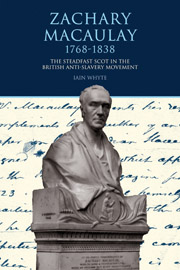Book contents
- Frontmatter
- Contents
- Foreword
- Acknowledgements
- Abbreviations
- List of Illustrations
- Chronology
- Introduction
- 1 From Inverary to the Sierra Leone River
- 2 Slave Traders and French Invaders
- 3 Captive in Love—to Selina Mills
- 4 The Trials of the Governor
- 5 Caught in a Multitude of Tasks
- 6 Clapham, Family and Friends
- 7 Attempting to Win France for Abolition
- 8 ‘Let Us Look it Up in Macaulay’—The Anti-Slavery Arms Manufacturer
- 9 Commerce and Conflict
- 10 Triumph and Tragedy on the Path to Glory
- 11 As Others Saw Him—As We Might Assess Him
- Bibliography
- Index
10 - Triumph and Tragedy on the Path to Glory
- Frontmatter
- Contents
- Foreword
- Acknowledgements
- Abbreviations
- List of Illustrations
- Chronology
- Introduction
- 1 From Inverary to the Sierra Leone River
- 2 Slave Traders and French Invaders
- 3 Captive in Love—to Selina Mills
- 4 The Trials of the Governor
- 5 Caught in a Multitude of Tasks
- 6 Clapham, Family and Friends
- 7 Attempting to Win France for Abolition
- 8 ‘Let Us Look it Up in Macaulay’—The Anti-Slavery Arms Manufacturer
- 9 Commerce and Conflict
- 10 Triumph and Tragedy on the Path to Glory
- 11 As Others Saw Him—As We Might Assess Him
- Bibliography
- Index
Summary
Apathy and Delay
Anti-Slavery International, today's successor to the organisation of which Zachary Macaulay was a founder, gives the chilling statistic that there are more slaves in the world than ever before. No governments and few but the most extreme individuals would today defend the institution. For that reason some modern observers assume that there was inevitable progress towards the abolition of slavery in the early nineteenth century. That is far too simple an analysis. The massive numbers of petitions which were to flow into Parliament in the years 1830–1833 seemed to have been met by determined resistance from the colonies to any moves towards emancipation. More seriously, political judgements from successive governments in power involved so much hedging, compromise and delay, that at times there seemed to be no end in sight. The tactics had to change and more urgent action needed to be taken. For the veteran abolitionists, among whom was Zachary Macaulay, it was not an easy transition to accept.
Despite the consistent flow of information from the Anti-Slavery Monthly Reporter, the public mood in the late 1820s was not strong enough to arouse Parliament, let alone the country, on the issue of slavery. One reason was that the West Indian representatives had become well organised and were countering Macaulay's information with their own propaganda. In addition, the Duke of Wellington's Tory administration, which lasted from January 1828 until November 1830, was far more concerned with Catholic emancipation and with resisting the growing pressure for parliamentary reform and the extension of the ballot than with events taking place in the West Indies.
- Type
- Chapter
- Information
- Zachary Macaulay 1768-1838The Steadfast Scot in the British Anti-Slavery Movement, pp. 217 - 241Publisher: Liverpool University PressPrint publication year: 2011

